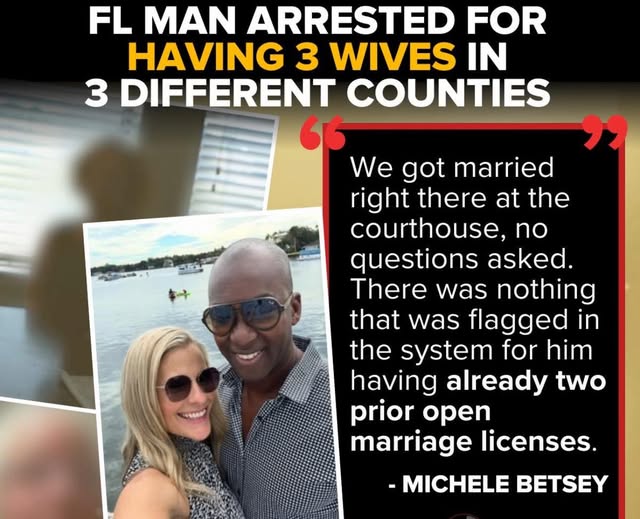In a case that reads more like a movie script than real life, three Florida women—Michele, Brandi, and Tonya Betsey—are speaking out after discovering they were all legally married to the same man: Henry Betsey Jr. What began as three separate journeys of love, commitment, and trust quickly unraveled into a tangled web of betrayal, deception, and legal chaos. The shocking revelation has not only shattered the personal lives of these women but also shed light on a serious flaw in Florida’s marriage license system—one that could allow such deceit to happen again.
For most people, a wedding is a celebration of unity and the beginning of a lifelong partnership. But for Michele, Brandi, and Tonya, their unions were built on false foundations, manipulated by a man who, according to their claims, knew exactly how to bypass detection by exploiting a systemic loophole. Their story has ignited widespread attention, raising critical questions about the lack of statewide communication between counties in Florida when it comes to tracking marriage records.
“There are no safeguards,” said Michele Betsey, one of the first to publicly speak out. “And I feel like that’s part of where the system failed.” Michele, like the other women, entered her marriage with Henry Betsey Jr. in good faith, believing she was starting a new chapter of life with a loving, committed partner. But unbeknownst to her, that very same man had already legally wed two other women—each in a different Florida county.
Brandi Betsey, another of the women deceived, explained just how calculated the scheme was. “He took each one of us to a county over to get married,” she revealed. The strategy, while simple, was devastatingly effective. Florida has 67 counties, and each maintains its own marriage license database. However, these databases are not interconnected. There is no centralized system that flags duplicate or concurrent marriage licenses—something Betsey Jr. allegedly used to his full advantage.
Tonya Betsey, the third wife to come forward, spoke candidly about the toll the discovery has taken. “If the counties did talk, it would have saved me a lot of heartache, a lot of money, a lot of stress,” she said. Her experience, like the others’, was filled with emotional devastation and financial fallout. Trust, once given freely, had been deeply violated.
The discovery didn’t come about all at once. It was a slow and painful process as the women, through chance encounters and inconsistencies in their husband’s stories, began to realize something was terribly wrong. As suspicions grew, so did their determination to uncover the truth. Eventually, the pieces fell into place: one man, three marriages, three lives manipulated and dismantled.
As shocking as the story is, it isn’t just about one man’s deceit. It is about a broken system that allowed it to happen. Florida’s county-by-county marriage license system operates independently, with no requirement to cross-reference records across jurisdictions. In an age of digital recordkeeping, this lack of communication between counties is not just outdated—it’s dangerous. It allows individuals with nefarious intent to slip through the cracks with minimal effort.
The case of Henry Betsey Jr. has now sparked conversations not just within Florida, but nationwide. Legal experts and policymakers are beginning to weigh in, examining how gaps in state and county recordkeeping can lead to real-life consequences. For Michele, Brandi, and Tonya, the goal is clear: to make sure no one else goes through what they did.
“I don’t want revenge,” said Michele. “I want reform.” The women are now advocating for legislation that would require counties to report marriage license data to a centralized, statewide database—one that could immediately flag individuals attempting to marry multiple people without proper legal dissolution of prior marriages. Such a system could also be linked to driver’s license numbers or social security records, offering an additional layer of verification.
The proposed reform isn’t without precedent. States like Texas and California have made significant strides toward centralized marriage license systems, using modern software solutions that streamline verification processes and reduce the likelihood of fraud. Advocates argue that in a state as populous and diverse as Florida, such measures are long overdue.
“We trust the system to protect us,” said Brandi. “But in this case, the system protected him.” The emotional weight of that realization continues to bear down on the women involved, but their unity in exposing the issue has offered them both healing and strength. No longer isolated in their experiences, they have found solidarity in each other—and a shared mission to create change.
In response to the public outcry, a few state legislators have expressed interest in exploring reforms. While no official bill has yet been introduced, discussions are underway to evaluate how other states are handling the issue and what Florida can do to modernize its marriage license infrastructure. Cybersecurity experts and government transparency advocates have also joined the conversation, emphasizing that secure, interconnected databases are not only feasible but necessary in a digital age.
In the meantime, Henry Betsey Jr. could face serious legal consequences. While bigamy is a criminal offense in Florida, prosecution can be complicated by jurisdictional hurdles and lack of evidence if the marriages were conducted under different names or with forged documents. Nonetheless, authorities are reportedly investigating the matter, and the women have retained legal counsel to explore all available civil remedies.
The social fallout for Henry has been swift. Once a man believed to be trustworthy and committed, he is now facing public scrutiny, media attention, and the real possibility of criminal prosecution. But for the women he deceived, the road to healing is only just beginning.
Friends and community members have rallied around Michele, Brandi, and Tonya, expressing support through social media, community meetings, and outreach efforts. Mental health professionals have also offered counseling services, understanding that the trauma of deception on such an intimate level can have long-term psychological effects.
Financial loss is another major concern. Each woman has recounted stories of joint bank accounts, shared leases, and pooled finances that now hang in legal limbo. Recovering from the emotional devastation is hard enough—but untangling the web of financial dependence and obligations left behind by Henry Betsey Jr. may take months or even years.
“I trusted him with my life,” said Tonya. “Now I have to rebuild that life from scratch.”
For many, the story is a cautionary tale—one that exposes how easy it is to assume that systems in place will protect us from fraud. But it’s also a call to action. With a simple change in data management and communication between counties, this entire situation could have been prevented.
The tragedy of Michele, Brandi, and Tonya’s shared story is not just in the betrayal they suffered, but in the fact that it could happen to anyone. Their courage to come forward, however, may be the catalyst needed to create change.
As the state of Florida begins to confront the shortcomings in its marriage license system, the women remain focused on what comes next. Not just for themselves, but for others who might unknowingly be at risk.
“We were three strangers,” said Michele. “Now, we’re sisters in this fight.”
The message they leave us with is clear: love should never come at the cost of truth. And systems meant to protect the sacred bonds of marriage must be fortified against manipulation. For the sake of every future bride or groom walking into a courthouse with hope in their heart, reform is not just necessary—it’s urgent.


